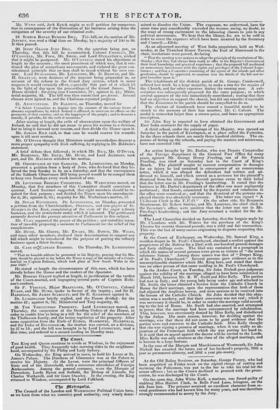An action brought by Mr. Darlot, who was Deputy Comptroller
of the Foreign department in the General Post Office for many years, against Mr. George Henry Freeling, son of Sir Francis Freeling, was tried on Saturday last in the Court of King's Bench. The plaintiff sought to recover compensation in damages for an injury he had sustained in consequence of an annonymous letter, which it was alleged the defendant had written and ad- dressed to himself, and which served as a pretence for the plaintiff's dismissal from his situation. Several persons swore to their belief that the letter was in Mr. Freeling's handwriting. It stated that the business in Mr. Darlot's department of the office was most negligently performed ; that frauds, committed by the deputies and subalterns in the office were connived at ; and that the dismissal of the persons em- ployed therein was absolutely necessary. The letter was signed " A Ci-devant Clerk in tbe F. P.O." On the other side, Sir Benjamin Stephenson, Sir Robert Smirke, and Mr. Laurence, the chief clerk in the Secretary's office; were positive that the letter was not in Mr. Freoling's handwriting ; and the Jury returned a verdict for the de- fendant.
The Lord Chancellor decided on Saturday, that the bargain made by Mr. Chambers with Mr. Waters for the purchase of the King's Theatre for seventy thousand pounds, was a valid and fair transaction. This was the last of many causes originating in disputes respecting this property.
In the Court of Exchequer, on Wednesday, Mr. Samuel King, a woollen-draper in St. Paul's Churchyard, obtained a verdict against the proprietors of the Satirist for a libel, with one hundred pounds damages and forty shillings costs. The libel was contained in a paragraph in which the names of several persons were given as visitors of "the most infamous Saloon." Among these names was that of "Draper King,. of St. Paul's Churchyard." Several persons gave evidence as to the unexceptionable character which Mr. King bore, and stated that there was no other person of that name residing in St. Paul's Churchyard.
In the Arches Court, on Tuesday, Sir John Nicholl gave judgment! against the validity of the marriage, alleged to have been solemnized in March 1831, between Mr. R. W. Swift and Miss Kelly. The parties had met in Italy ; and the young lady being under age and attached to • Mr. Swift, the latter obtained a licence from the Catholic Church in Rome for their marriage, upon the representation that both of them had abjured the Anglican heresy, and were anxious to be received into the bosom of the Catholic Church. Sir John decided that this abju- ration was a mockery, and that their conversion was not real ; which it was necessary it should be, in order to render the marriage valid accord- ing to the law of Rome. Mr. Swift had also asserted, and attempted to prove, that the marriage had been consummated by cohabitation. This however, was strenuously denied by Miss Kelly, and disbelieved by the Judge. His main reason, however, for ,deciding against the. marriage, was that there did not seem to be good , evidence that the parties were real converts to the Catholic faith. Miss Kelly thought that she was signing a promise of marriage, when it was really' an ab- juration of the Protestant faith which she was putting her hand to. It is said that an appeal against the decree will be carried to the Lords. Miss Kelly was only nineteen at the time of the alleged marriage, and is heiress to a large fortune.
In the case of the Marquis and Marchioness of Westmeath, Sir John Nichol' has awarded the latter' out of her husband's property, 7001. a year as permanent alimony, and 300/. a year pin-money.


















 Previous page
Previous page